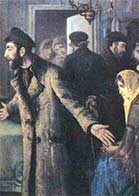Agunot

Ta'anit Esther, the traditional fast day preceding Purim, will be observed tomorrow. In recent years it has been designated as an international day of study, reflection, and calls to action on behalf of agunot, literally "anchored" or "bound" women.
In biblical and talmudic law, a marriage is dissolved upon certain proof of a spouse's death or upon the granting of a divorce (get) at the husband's discretion. Each of these halakhic requirements can leave a woman languishing for years, tortured either by her husband's uncertain fate or by his malicious will. Though technically the term agunah is reserved for the former condition, it has also come to stand for the latter.
The suffering these laws can cause was recognized by the Mishnah and Talmud themselves, which created exceptions and allowed for compelling a recalcitrant husband to grant divorce. Leading rabbis offered whatever leniencies they could, and reputations were often made on an agile jurist's ability to free an agunah from her chains. Yet the essential requirements of halakhah remained in place, in fatal collision with basic, God-given instincts of justice and compassion.
In modern times, these legal strictures came to be felt all the more acutely as, thanks to economic and political pressures, men were on the move in unheard-of numbers, and as traditional communal authority waned along with its ability to sanction wayward or missing husbands. Writers dramatically depicted the agunah's plight as a powerful indictment of traditional society; women themselves became increasingly resistant to the demands of the law. Yet still the requirements held.
In contemporary Israel, where marriage and divorce are in the hands of the chief rabbinate, the often extreme stringency of the ultra-Orthodox has engendered new waves of protest and criticism, but also innovative measures to deal with the problem. These include prenuptial agreements proposed by moderate rabbis working with women scholars of the law. A resolution of the agunah problem, once and for all, may be the ultimate test of halakhah's ability to find, or recover, its moral voice.
Comments are closed for this article.




